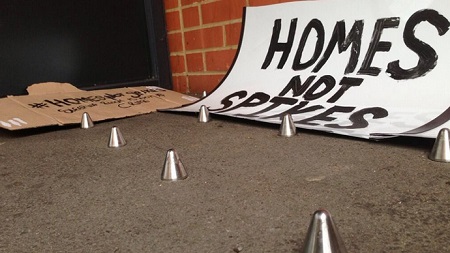 In deed if not in word, London’s homeless population are now on par with pigeons. No, they have not gained the ability to fly, but they are deemed so troublesome that special “spike” beds have started to appear on pavements to deter homeless people from sleeping in those areas.
In deed if not in word, London’s homeless population are now on par with pigeons. No, they have not gained the ability to fly, but they are deemed so troublesome that special “spike” beds have started to appear on pavements to deter homeless people from sleeping in those areas.
The spikes, initially spotted outside a building in Southwark, have caused something of a public outcry. Conservative Mayor Boris Johnson has even launched himself into the fray, in the process denouncing the thorny additions to the public space as “stupid” and “self-defeating.”
Whether intending to or not, his comments have alluded to wider problems within British society. Rather than tackle the fallout of economic crisis and the resulting increase in the homeless population, a growing number of people have taken up the view that the less fortunate are merely an irritant best sent on their way.
Indeed, the notoriously incoherent celebrity Katie Hopkins – who continues to make a name for herself in defending privilege and the status quo in her own belligerent style – has unfortunately weighed in with her two cents, claiming that those protesting the spikes would feel differently if they had a homeless citizen attempting to use their “doorway as a bedroom and toilet each night”.
Whether this is an attempt to get people to sympathize with the residents of affluent London flats enduring the horrors of seeing a homeless sleeper outside is anyone’s guess, but the fact remains that the spikes are a shameful reminder of our inability to tackle Britain’s homeless problem.
This calamity is intimately tied to economics. According to research conducted by the homeless charity organization, Crisis, “all forms of homelessness have risen due to the shortage and high cost of housing combined with the government’s policies – particularly reforms and cuts to housing benefits.”
Crisis reports that one in ten people in the UK claim to have endured homelessness at some point in their lives, with one fifth of those stating that it happened in the last five years. Over 2,414 people allegedly slept outdoors each night due to homelessness over the course of 2013, a rise of thirty six percent over the previous three years.
In London, due to its particular concentration of both population density and poverty, the figures are even more alarming. The capital hosts over half of the UK’s homeless people, with findings indicating that over the period of 2012-2013, 6,437 people slept on the streets at various points, marking a startling 75 percent increase over the past three years.
According to a research paper compiled last year by the charity organization St. Mungo’s Broadway and the National Health Service, the average life expectancy of a homeless person works out at 47 years – a glaring contrast with the rest of the population, which has an average life expectancy of 77 years. Perhaps unsurprisingly the homeless were found to be nine times more likely to commit suicide than other citizens and three times as likely to be involved in traffic accidents. Diseases – both physical and psychological – were found to be rife.
Yet like many nations, Britain is a signatory to the International Covenant on Economic and Cultural Rights, and as such its citizens are legally recognized as having entitlements directly linked to the question of housing. Article 11 of the Covenant clearly states that all participating state parties shall recognize the right to an “adequate standard of living” for individual citizens, as well as “adequate food, clothing and housing, and to the continuous improvement of living conditions.”
 Closer to home, the spirit of the Covenant is further reinforced by the European Convention on Human Rights, with Article 8, albeit in more ambiguous terms than those of the Covenant, holding that “Everyone has the right to respect for his private and family life, his home and his correspondence.”
Closer to home, the spirit of the Covenant is further reinforced by the European Convention on Human Rights, with Article 8, albeit in more ambiguous terms than those of the Covenant, holding that “Everyone has the right to respect for his private and family life, his home and his correspondence.”
Yet in a weighty report published late last year, the United Nation’s special own rapporteur for housing, Raquel Rolnik, blasted the UK government policy as being to the detriment of human rights fulfilment. Her findings ruffled feathers government-wide, with claims that Britain faced a “critical” situation in regards to “availability, affordability and access to adequate housing.”
In an interview with Al Jazeera, the Brazilian-born UN rapporteur for housing went on to single out one of the more controversial policies of the British government, that being the now notorious “bedroom tax” as having “an enormous impact on [a citizen’s] right to housing and also on other human rights, like the right to food [and] the right to education.”
What is the bedroom tax? Brought in alongside other adjustments included in the Welfare Reform Act of 2013, the tax serves as an “under occupation penalty” for those in receipt of state-funded housing benefits intended to assist them with paying rent. If found to have a spare bedroom, the occupant is liable to a weighty fourteen percent reduction in housing benefits, with penalties mounting to up to a twenty five percent cut for two or more unoccupied rooms.
As mundane as that sounds, such a reform is actually hitting some of the most vulnerable in British society by imposing a financial penalty based on a legal ambiguity. What constitutes a spare bedroom has not yet been adequately defined, with the Housing Benefit Office working solely on tenancy agreements and the word of landlords to determine how many bedrooms a property may have.
In a report compiled by the Habinteg Housing Association, it was claimed that two thirds of properties affected by the bedroom tax were occupied by disabled tenants. According to Habinteg, many disabled people require additional space for storing equipment, as well as permitting their care-givers to stay overnight. Yet exempting the disabled from the tax appears to be implemented in an increasingly haphazard manner.
A typical response from the government has been to advocate “downsizing” where those affected by the cut to their housing benefits simply relocate to a smaller property with fewer bedrooms. Habinteg noted over the course of April to September of 2013 that a number of their disabled tenants had made requests to move to smaller housing units – the majority of them citing the bedroom tax as their prime reason.
But are smaller homes always available? According to the UN, around a quarter million new housing units were required in 2012 to keep up with population growth. Only 115,000 were constructed, however, with 89,000 of those being held within the private sector.
Even more disconcertingly, the UN cites evidence that the private sector has become a last refuge for those desperate to find a place to live, with waiting lists for social housing in England having increased by 81 percent since 1997. This presents additional problems in that rent levels in private housing have actually increased by 37 percent over the past five years, with house prices themselves rising by a startling 200 percent between 1997 and 2012. Full-time wages have risen by just 55 percent over that same period. In addition, 35 percent of privately-rented homes do not meet the Decent Homes Standard outlined by the previous Labor government. All of these statistics demonstrate that the UN’s Raquel Rolnik is indeed justified in speaking of a crisis in housing.
Yet some beg to differ. Dubbed a “loopy Brazilian lefty” by Conservative party MP Stuart Jackson, Rolnik’s report was subsequently dismissed as “misleading Marxist diatribe.”
This bombardment of criticism is perhaps unsurprising. The UN rapporteur is already known by governments internationally as having a no-compromise stance when it comes to human rights, having taken on both Israel and the US in fierce criticisms of housing policies she feels are unfair and illegitimate.
Yet it wasn’t just the attack on existing policy that really set a fire under government policy. Rolnik went further in her analysis, blasting the alleged glory days of British conservatism under Margaret Thatcher and the Housing Act of 1980 as playing a decisive role in the gradual erosion of cheap social housing.
This particular piece of 1980 legislation – which may have initially seemed like a benevolent measure to allow tenants of social housing to purchase the property they lived in – was revealed in fact to be playing a destructive role in the housing crisis. The gradual transfer of housing units from the state to the private sector was found to be partly responsible for the current lack of affordable homes; in the 1970s social housing constituted 30 percent of existing stock, yet by 2007 the figure had been reduced to 18 percent.
The actual number of those with nowhere to live is hard to gauge. Homeless people forced to sleep outdoors are thought to only be a fraction of the total number of individuals at risk, with others leading a precarious existence in squats or hostels as they await assignment to social housing. These “hidden homeless” constitute an uncertain quantity, yet one that is on the rise. Over 112,000 people are thought to have approached their local council authority in the past year to seek help; an increase of 26 percent from 2010.
Yet within the corridors of power it seems that the best way to dismiss the UN’s findings was to pretend they were made up. Housing Minister Kris Hopkins, himself a member of the Conservative Party, denounced the UN report as “partisan” and “discredited.” Not to be outdone, the Department for Work and Pensions went as far as to state that the Rolnik’s conclusion “was clearly written before any research was actually completed.”
Though Rolnik seems to have disappeared from the minds of British conservatives for the time being, it’s important to keep her findings in mind when recalling Boris Johnson’s claim that anti-homeless spikes are “stupid” and “self-defeating.” The spikes themselves are symbolic of our inability to acknowledge, let alone tackle, an issue that is considered an infringement on the basic human rights of British citizens.
